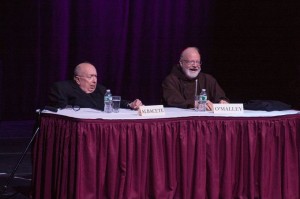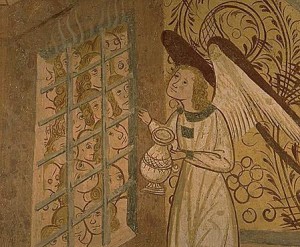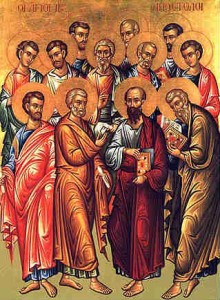 Cardinal O’Malley (of Boston) was a longtime friend of Monsignor Lorenzo Albacete. It was O’Malley who offered the Mass of Christian Burial and delivered the following homily. I laughed and cried. It is a beautiful text for learning the faith, and sharing friendship. Be prepared.
Cardinal O’Malley (of Boston) was a longtime friend of Monsignor Lorenzo Albacete. It was O’Malley who offered the Mass of Christian Burial and delivered the following homily. I laughed and cried. It is a beautiful text for learning the faith, and sharing friendship. Be prepared.
Allow me first of all to tender my heartfelt condolences to Manuel, to Mary and Olivetta, to the many friends and the C.L. (Communion and Liberation) communities.
I spoke with Cardinal Wuerl yesterday, he wanted to be here and sends regards and assurances of prayer and condolences. The Cardinal has asked Fr. Lee Fangmeyer and Fr. Frank Early to represent him and the archdiocese of Washington. Father Lorenzo was very proud to be a member of the clergy of Washington.
I also wish to express gratitude to the Parish of St. Mary’s where for many years father Lorenzo celebrated the Spanish mass. Thank you, Fr. Andrew, for your gracious hospitality.
We are also pleased that Archbishop Roberto Gonzalez, such a close friend of father Lorenzo’s, Bishop Cisneros, Fr. Jose Medina, and Fr. Chris Marino are all with us this morning. We are especially pleased that the supreme Knight Carl Anderson and his dear wife Dorian are here as well.
“Harto dificil resulta para mi…”
These were the opening words of my homily at Lorenzo’s first Mass. they became sort of a code that I would throw into a talk if Lorenzo were present. That would always get a rise out of him.
But today these words ring true: Harto dificil resulta para mi.
This is very hard for all of us who love this man.
Graham Greene, Evelyn Waugh and Garcia Marquez together did not have enough imagination and genius to invent Father Lorenzo Albacete Cintrón. Only God could create a Lorenzo and then He broke the mold because the world did not deserve to have two Lorenzo’s.
In the English world, the day after Christmas is boxing day, a day when employees and tradesmen would receive gifts. If Puerto Rico had a boxing day it would be the day after the feast of the Epiphany or” Reyes” as the Boricuas say; it would be January 7. That is the day Lorenzo arrived in this world. He has truly been a gift, a gift of the Magi to borrow the title from O’Henry’s story, but Lorenzo is the gift of the Magi, the Reyes.
He has certainly been a gift in my life for almost 5 decades. I had met Lorenzo at that time in his life when he took his famous vacation to Bogota, Colombia. A vacation Manolo arranged for Lolo (for Lorenzo). Later Lorenzo told us how he disguised himself as a priest to get near Pope Paul. When he confessed to the Pope he was not really a priest, Blessed Pope Paul said: “Why don’t you become a priest?
It was also around that time when Lorenzo first met Cardinal O’Boyle the Archbishop of Washington. Lorenzo and I spent a lot of time at St. Matthews Cathedral where I was working with Rosario Corredera and the Hispanic community. Lorenzo used to drive me very often. One day, as he was wont to do, Lorenzo parked in the Cardinal’s parking space… (Any ‘no parking’ sign was an invitation to Lorenzo.) At that moment Cardinal O’Boyle was approaching and confronted Lorenzo: “who are you,” he asked. Lorenzo replied: “I am the Cardinal”. Cardinal O’Boyle, who was something of a curmudgeon, answered back: “I am the Cardinal!” To which Lorenzo said: “yes, you are the day Cardinal; I am the night Cardinal.”
It is no wonder that after his first Mass, Lorenzo’s mother asked me to bless her new apartment. I said, “But, doña Conchita, your son was just ordained.” She said, “Yes, padre, but I think he is joking.”
Sometimes Lorenzo ruffled the feathers of the hierarchy.
Cardinal Hickey installed a special phone with an answering machine for priests so that a priest could call it any time if he had a problem. Lorenzo used to call and say things like: “your Eminence, I’ve lost my car keys, could you help me find them.” After the Cardinal was convinced that Lorenzo was not a mental case, he made him his theological advisor.
When Lorenzo was working in Boston, he brought a car phone. Only the president of the Unites States, the chief of police and the head of the mafia had a car phones in those days. When Lorenzo had a car phone installed, I chided him for his extravagance and warned him that the auxiliary Bishop was very critical of Lorenzo’s spending habits. So Lorenzo said: “really? Let’s call him up.” So Lorenzo called the Bishop from his phone in the car and said: “I’m out for a ride with Bishop Sean and I’m calling you on my new car phone. Whoops. I have to hang up, my other car phone is ringing now.” Likewise in Boston when Lorenzo was asked to preach one of the Seven Last Words for the Good Friday services at the Cathedral of the Holy Cross, Lorenzo said: “which of the seven last words Am I supposed to speak on?” When he was told that he should preach on: “my God, my God, why have you forsaken me?” Lorenzo replied: “good, I won’t have to prepare.”
And when he was installed as the Rector Magnifico of the Pontifical Catholic University of Puerto Rico, he was standing next to me on the stage. Lorenzo was wearing a baby blue academic gown with royal blue velvet panels in the ample sleeves, a colorful hood on his back, and a velvet bonnet with a golden tassel. He was carrying something that looked like a wand. Lorenzo turned to me and said: “If this gig as president doesn’t work out, I could get a job with Walter Mercado, (who is a very flamboyant Puerto Rican psychic and astrologer with a Liberaci-sque wardrobe.)
Lorenzo’s friendship with John Paul II dates to when the then Cardinal Wojtyla visited Washington. Cardinal Baum asked Lorenzo to drive the future Pope around. After he returned to Poland Cardinal Wojtyla wrote to Lorenzo with comments and ideas on the research Lorenzo was involved in at the time. A few years later John Paul II returned to Washington. When he met Lorenzo at St. Matthews he said: “Lorenzo, maybe now you will answer my letters.”
Years later Lorenzo was called to Rome to present plans for the John Paul II Institute along with a father from Opus Dei. The priest from Opus Dei was impeccably dressed in his cassock, well groomed for the occasion. He had his copious and well-developed notes in a beautiful leather binder. The priest began by saying: “your Holiness, I did not sleep at all last night knowing that today I would have to make this presentation to the Vicar of Christ on earth.” He then made a very formal and thorough presentation of his well-developed ideas. Afterwards Pope John Paul turned to Lorenzo and asked him to make his presentation. Lorenzo, with a menu of two weeks on his clerical shirt, began by saying: “your Holiness, Your Holiness, I slept very well last night.” Lorenzo then produced an envelope from Riggs Bank, from his suit coat pocket and declared: “I had an overdraft in my checking account, so the bank notified me and sent me this envelope.” He then read his brilliant notes from the back of the envelope and thoroughly entertained St. John Paul II.
We must be careful not to be so dazzled by Lorenzo’s incredible sense of humor. (Fue el hombre más occurente que había conocido en toda mi vida). There was so much more to Lorenzo. What was so out there were: his zany wit, his unkept appearance, his disorganized life, his financial problems, his phobias and his eccentricities. But as Erasmus said of Thomas More: “He was made and born for friendship.” What a capacity for unconditional love! He made everyone feel at home, you knew that you were with a friend. “En el crepusculo de la vida, seremos juzgados solo por el amor,” said San Juan de la Cruz. “At the end of our life we will be judged only by how much we loved.”
Lorenzo’s love for his family, for Conchita, for Manolo, and for friends on every continent, Catholics and atheists, Jews and Protestants was unfailing Lorenzo’s love touched everybody, whether they were from Triumph Magazine to the New Republic. He had what the Spanish call “don de gente.”
That capacity for love, compassion, empathy, made Lorenzo a great friend and a great priest, because the goodness of the Good Shepherd could be glimpsed in his goodness.
Lorenzo’s was not an easy life and his problems were a great source of worry to those of us who were close to him. There were so many false starts. Lorenzo’s meteoric career as President of the Universidad Católica in Ponce. After Lorenzo lost his job as Rector, I sent him two quotes from Fray Luis de León:
“Que descansada vida
la del que huye del mundanal ruido
y sigue la escondida senda
por donde han ido
los pocos sabios que en el mundo han sido.”
After experiencing what envy and intrigue can do to you, Lorenzo was like Fray Luis who wrote:
“Y con pobre mesa y casa
en el campo deleitoso
con solo Dios se compasa
y a solas su vida pasa
ni envidiado ni envidioso.”
Lorenzo’s tenure at Dunwoody was cut short; and his writing for the Sunday Magazine of New York Times came to naught.
But all of the pain and disappointment was dissipated because of Lorenzo’s friendship with Don Giussani. Communion and Liberation was a God send for Lorenzo. And I believe that Lorenzo was a God send for C.L. God’s loving providence engineered this wonderful match. Lorenzo loved young people and was such a gifted teacher and mentor to them. His genius was to be able to dialogue with the culture, science, and with the media. His intellect was so bright and still more illumined by his deep faith.
The love and devotion of the C.L. Community, Olivetta Danese and so many who really cared for Lorenzo and allowed him to accomplish so much, to blossom. All of the wonderful articles inTracce and other publications, the retreats and conferences would never have happened without the help and support of CL. Lorenzo dedicated his book God at the Ritz to Don Giussani from whom Lorenzo learned so much. Lorenzo defines suffering as a thirst for meaning, for understanding, for solidarity, for friendship, for affirmation. Lorenzo said: “The one who suffers wants to be assured that he or she is not crazy, guilty, an outcast for life. I have tried to show how suffering can be a point of departure towards an encounter with Mercy as the origin and destiny of life.”
Today we are consoled that Lorenzo’s suffering was that point of departure, a preface to an encounter with Mercy.
The Emmaus story documents the encounter of two disciples, overcome with grief and fear, and the Risen Christ who seeks them out like the Hound of Heaven. It is the story of a journey and an encounter, two concepts dear to Don Giussani and Lorenzo. It is the story of pain and loss, being transformed into new life and joy. The disciples are running from Calvary, they are seeking safety and they find Christ. Or Christ finds them.
They engage in a conversation. Cor ad cor loquitur. Their hearts are burning within them. Lorenzo engaged in so many of those conversations that allowed people to discover the reality of Christ. Lorenzo’s journey touched the lives of many fellow travelers and allowed them to experience Christ no longer as a stranger, but as a friend.In his own brokenness, Lorenzo could break open the word of God and release its power.
To me, one of the most fascinating lines in this Gospel is where Luke records that Jesus “gave the impression that He was going on farther.” At that moment the disciples might have said: “great talking to you. So long. See you around.” This Gospel would never have been written if they had not invited Jesus to stay with them. Christ wants to be invited. At supper, Jesus shares with them His identity and allows them to recognize Him in His self giving in the breaking of the bread. In St. Matthew’s Cathedral the De Rosen mosaic behind the altar of the Blessed Sacrament depicts the two disciples filled with Eucharistic amazement and the inscription declares: “they recognized Him in the breaking of the bread.” The Lord disappears, but the bread remains, now in the tabernacle, the Body and Blood of Christ.
They set out at once and returned to Jerusalem. They were now willing to risk their lives to share the Good News. They become participants of the mission of their Master to bring glad tidings, to liberate those captive by fear in the Cenacle, to place on those who mourn in Zion a diadem instead of ashes.
I like to think that Cleopas and his buddy were at the Cenacle with Mary and the Apostles for the outpouring of the Spirit on the Church. And I see them in today’s second reading from Acts, part of that community, devoted to the teaching of the Apostles, holding all their material goods in common, caring for the needs of all, and most importantly gathering in their homes for the breaking of the bread. Discipleship really is about liberation and communion. And the joy of knowing that the Lord added to their numbers those who were being saved.
Lorenzo’s journey was an Emmaus journey where Christ the stranger becomes Christ the friend and liberator. Lorenzo was an eloquent messenger of the joy of the Gospel. He found his strength in the Eucharist, he recognized Jesus in the breaking of the Bread.
Let me conclude with the prayer of an old priest, painfully aware of his own limitations and brokenness who reflects that when he lifts the host, he is overwhelmed by his own unworthiness, and he pleads with God that just as the priest held God in his unworthy hands, that God will never let him slip from God’s divine hands.
PLEGARIA DE UN SACERDOTE
(Lope de Vega)
Cuando en mis manos, Rey eterno, os miro
y la cándida víctima levanto,
de mi atrevida indignidad me espanto
y la piedad de vuestro pecho admiro.
Tal vez el alma con temor retiro,
tal vez la doy al amoroso llanto,
que, arrepentido de ofenderos tanto,
con ansias temo y con dolor suspiro.
Volved los ojos a mirarme humanos,
que por las sendas de mi error siniestras
me despeñaron pensamientos vanos;
no sean tantas las desdichas nuestras
que a quien os tuvo en sus indignas manos
vos le dejeis de las divinas vuestras.
Heavenly Father,
In thy hands we commend our brother, Lorenzo.
Hold on tight.
Seán Patrick Cardinal O’Malley
Archbishop of Boston
Homily Monsignor Albacete Funeral Mass
St. Mary’s Church, Manhattan
October 28, 2014
 The Year of Consecrated Life begins with the First Sunday of Advent 2014 and concludes with the World Day of Consecrated Life, 2 February 2016. The USCCB staged a media conference announcing the year’s activities in the United States. The bishops’ plans include “Days with Religious,” a series of initiatives and resources to help people learn about the consecrated life of religious men and women. Activities will focus on sharing experiences of prayer, service, and community life with those living a consecrated life.
The Year of Consecrated Life begins with the First Sunday of Advent 2014 and concludes with the World Day of Consecrated Life, 2 February 2016. The USCCB staged a media conference announcing the year’s activities in the United States. The bishops’ plans include “Days with Religious,” a series of initiatives and resources to help people learn about the consecrated life of religious men and women. Activities will focus on sharing experiences of prayer, service, and community life with those living a consecrated life.





